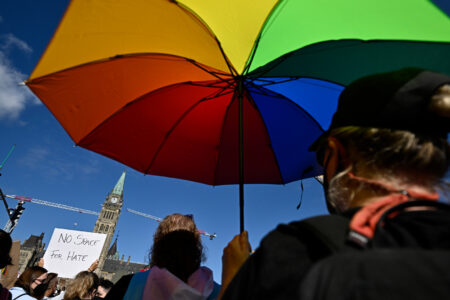
Canada 150 has gotten a rough ride lately.
Francophone Quebecers are less inclined to celebrate it than other Canadians. The “Other 150” movement reminds Quebecers of the discrimination and backlash against francophones and their rights. Many Indigenous politicians and writers aren’t celebrating Canada 150 either, citing the ghastly legacies of the residential school system, Canada’s broken treaty promises and the ongoing violence and discrimination against Indigenous people in Canada. Some commentators even say that commemorating Canada 150 amounts to celebrating Indigenous genocide.
There’s also a larger backlash against commemorating historical figures like John A. Macdonald. A proposal to erect statues of the prime ministers at Wilfrid Laurier University was cancelled after protests by students and professors. Critics said the statues were disrespectful to Indigenous, women and minority populations, citing the racist and discriminatory policies of leaders like Macdonald. Statues of Macdonald have been vandalized, and ceremonies honouring him have drawn protests. More broadly, some academics are criticizing the commemoration of Canada 150, saying that it would “legitimize the Canadian project and the idea of Canada.”
There’s a troubling implication here: that Canadians almost shouldn’t be allowed to take any sort of pride in their identity or history. Apparently we’re supposed to either uncritically commemorate Canadian history and identity, or condemn it as entirely dark and ugly.
If John A. Macdonald used to be seen as nearly flawless, today he seems to be seen more as a real-life Darth Vader. We somehow can’t credit Macdonald for the skills Christopher Moore wrote about in his book 1867: How the Fathers Made a Deal. Macdonald succeeded in building coalitions with people of different interests and getting them to cooperate, even when they had different goals, which was so essential in building the British North America Act. We also can’t credit Macdonald for his understanding of francophone Quebec’s concerns, exemplified in his observation that if you “treat them as a nation…they will act as a free people generally do — generously. Treat them as a faction and they will become factious.” Nor can we credit Macdonald for his support of francophone language rights across Canada, which Gwyn noted in Nation Maker: Sir John A.: His Life, Our Times. Macdonald’s stance made the early Quebec nationalist Henri Bourassa salute him as the man who best understood Confederation’s spirit.
Then there’s Sir Wilfrid Laurier. Barbara Robertson quoted him in Wilfrid Laurier: The Great Conciliator as calling Canada a “harmonious whole, in which granite, marble, oak and other materials were blended.” He disdained the idea of making any of those elements change themselves, saying that he wanted “the granite to remain granite, and the oak to remain oak.” Other commentators have cited Laurier’s efforts to unite Canadians by reminding them of their common values and his work to build a positive patriotism in Canada, based on mutual recognition of peoples’ different backgrounds.
On the other hand, the racist actions of Macdonald, Laurier and others, such as their support of the Indigenous residential schools and the Chinese head tax, among other policies, can’t be ignored.
How does one reconcile admiration for Macdonald and Laurier with the racism that they and too many other Canadians of their time demonstrated? In my case, I commemorate their accomplishments in building bridges between different groups of Canadians and searching for common ground. However, I also lament the way they applied their principles only to people of northern and western European descent. They were supporters of the Anglo-American school of thought and unfortunately reflected its tendency to reserve its benefits for others like themselves.
That’s why it is so important to recall aspects of our past such as the catastrophic impacts of colonialism on Indigenous people, the discrimination against speakers of French across Canada and the bigotry behind events such as the razing of Africville in Nova Scotia or the internment of Canadian citizens whose ancestors came from enemy nations in the world wars. Unfortunately, many Canadians are frustratingly ignorant of these parts of our history. Canada 150 is an ideal time to remember them.
But we can also recall the more positive effects Canada has had on the world. We’ve made scientific contributions such as insulin and epilepsy treatments, the electron microscope, the BlackBerry and standard time. Canada has contributed to diplomacy through the resolution of the Suez Crisis, actions against apartheid in South Africa, the creation of the British Commonwealth, support for the creation of Israel and the defeat of the Nazis in the Second World War. Cultural and artistic contributions have come from Canadians ranging from Mary Pickford to Graham Greene to Aubrey Drake Graham to the Guess Who to Cree Summer to David Cronenberg. Canada is a place of refuge for people fleeing conflicts, ranging from the British Loyalists to Irish migrants fleeing famine to the victims of Communism to people affected by more recent conflicts in places like Afghanistan and Syria. People from all over the world have found new homes and lives in Canada, and newcomers are in fact the people most interested in commemorating Canada 150.
But the darker side of our history is all too obvious. Why is it surprising that so many Indigenous people don’t want to commemorate Canada 150 when their communities are chronically underfunded, when they continue to experience physical and sexual violence in Canadian cities or when the fallout of the residential schools and the Sixties Scoop continues to affect them today? How can we as Canadians deny that we have, quite frankly, done an abysmal job of living up to our treaty obligations? Chelsea Vowel notes that everyone living on the lands that form Canada is probably here to stay, but that we cannot expect to live together peaceably until the issues she and many other Indigenous activists are raising are actually addressed.
Similarly, Quebec Premier Philippe Couillard is talking about the need to formally recognize Quebec’s distinctiveness in the Constitution, and Quebecers are less inclined to commemorate Canada 150 than other Canadians. These developments suggest that there are still significant issues about Quebec’s place in Confederation, and its relations with the rest of the country, that need to be resolved.
It does as much of a disservice to Canadians to present our history and identity as something to be totally shamed as it does to present them as something to uncritically celebrate. Both our successes and our shames define us, and to ignore either is to ignore a critical part of who we are.
For me, Canada 150 is a time to commemorate the ideals we say we adhere to, the times when we have met our own high standards and the contributions we have made to the world. However, it is also a time to critically consider our past shortcomings and the fact that one of Canada’s defining flaws is its frequent failure to fulfill its own rhetoric.
That is where true patriot love comes from: loving our country and its heritage, but also regretting its faults. It comes from understanding the past — all of it — and learning from it, in order to truly live up to the ideals that Canada is supposed to stand for.
Photo: Shutterstock/Chase Clausen
Do you have something to say about the article you just read? Be part of the Policy Options discussion, and send in your own submission. Here is a link on how to do it. | Souhaitez-vous réagir à cet article ? Joignez-vous aux débats d’Options politiques et soumettez-nous votre texte en suivant ces directives.








